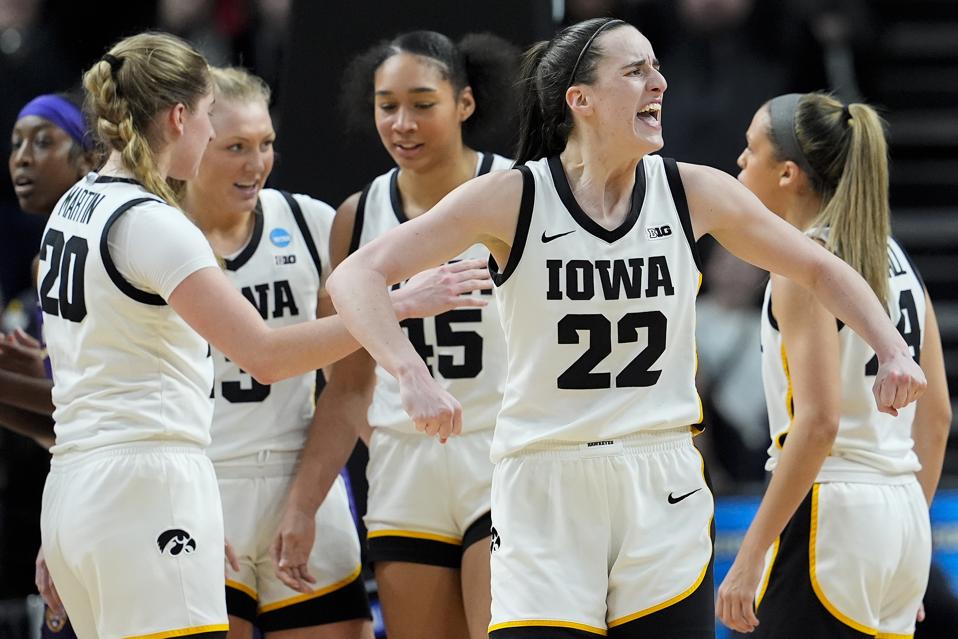The captivating artistry of Iowa guard Caitlin Clark has brought record attention and exposure to NCAA women’s basketball. It is not a stretch to say she has revolutionized her game. If only the NCAA could catch up.
Clark became the leading scorer in NCAA men’s and women’s history this season, and her play has been the through line for a national audience. She brought Steph Curry’s range and NIL — name, image and likeness — benefits onto the women’s stage.
“Ted Lasso” star Jason Sudeikis wore a hoodie that read, “everyone watches women’s sports” at the Iowa-LSU Elite Eight game Monday.
But with the good comes the bad. Advanced scrutiny can reveal flaws, and NCAA has been left with multiple issues to address before the 2024-25 tournament.
The NCAA botched the three-point line on the court at the Moda Center in the Portland Regional in Portland, Ore., and the housing arrangements for the first- and second-round games in Spokane, Wash., were sub-standard.
Tournament officials were not immune. Referees waffled on the rule regarding Notre Dame star guard Hannah Hidalgo’s nose ring — she wore it for the first two tournament games, as she had done all season, but was told to remove it in the second quarter of a 70-65 loss to Oregon State in the Sweet 16.
A referee was replaced at halftime of the North Carolina State-Chattanooga first round game in Portland after it was learned that she was a Chattanooga alum.
March Madness, another way. Growth begets growing pains, and no one is immune.
It took a fan to notice the mistake in the court measurements before the Texas-North Carolina State game at the Moda Center on Sunday, according to the Washington Post. The distance of the three-point line above the top of the key on one side of the court was too short.
After both coaches were made aware of the situation, they opted to play the game as is instead of delaying the start an hour or so before the court could be re-done. The court manufacturer, Connor Sports, admitted its mistake, and the NCAA blamed Connor.
“I hate to say this, but I have a lot of colleagues who would say, ‘Only in women’s basketball,’” Texas coach Vic Schaefer told reporters after a 76-66 loss to North Caroline State in the Elite Eight Portland on Sunday.
“It’s a shame, really, that it even happened.”
Clark, meanwhile, has turned the NCAA Final Four into appointment viewing, as her Hawkeyes have been all season while rolling to a 33-4 record and a No. 1 tournament seed as they prepare for a semifinal against Connecticut on Friday.
Iowa has drawn lines-around-the-arena sellout crowds in the wintery Midwest at home and on the road. The top five most in-demand NCAA women’s games this year included Iowa, according to secondary ticket marketer Vivid Seats.
Since Clark began playing in 2020, the average price of a ticket for an Iowa game is up 224 percent, Vivid Seats told the Associated Press, and the average distance traveled by a fan to watch Iowa play is up 34 percent from the 2022-23 season.
Clark led Iowa into the Final Four with a 41-point, 12-assist presentation in a 94-87 victory over defending national champion LSU in Albany, N.Y., on Monday. (On Tuesday, the least expensive ticket for the two NCAA semifinal games on StubHub was listed at $784.)
The win enabled the Hawkes to avenge a 102-85 loss to LSU in the 2023 championship game, in which LSU forward Angel Reese had a 15-point, 10-rebound double-double and punctuated the win with the John Cena “you can’t see me” hand gesture toward Clark. Clark also had used that gesture in the past.
Reese had 17 points and 20 rebounds, her 10th straight NCAA tournament double-double Monday, but a postgame news conference said she has encountered racial slurs and dealt threats in the last year. Reese is Black. Clark is White.
“I’ve been through so much,” Reese said. “I’ve seen so much. I’ve been attacked so many times. Death threats. I’ve been sexualized, I’ve been threatened. I’ve been so many things, and I’ve stood strong every single time.
“I’m still a human. All this has happened since I won the national championship … And it sucks, but I wouldn’t change anything, and I would still sit here and say I’m unapologetically me. I’m going to always leave that mark and be who I am and stand on that.”
The Utah women’s team was the target of racial hatred during its first two NCAA games. The games were played in Spokane, a town of 230,000 and the home of host Gonzaga, which beat the Utes in the second round.
Because hotel space was limited in Spokane, Utah was quartered in Coeur d’Alene, Idaho, which is 40 minutes east has an history of White nationalism. Five members of the neo-Nazi Patriot Front were convicted of conspiring to disrupt gay pride celebration there in 2022, and police received death threats after arrests were made.
During their stay, the Utah team was the target of two racist hate crimes, when motorists gunned trucks and yelled the “n” word as the team and staff left its hotel. The NCAA eventually moved the team to another hotel.
“We had several instances of some kind of racial hate crimes towards our program, and incredibly upsetting for all of us,” Utah coach Lynne Roberts said. “You think in our world in athletics and university settings it’s shocking. There is so much diversity on a college campus and so you’re just not exposed to that very often.
“Racism is real. It happens. It’s awful. For our players and staff to not feel safe in an NCAA tournament environment, it’s messed up. This should be a positive for everybody involved. This should be a joyous time for our program. To have kind of a black eye on this experience is unfortunate.”

